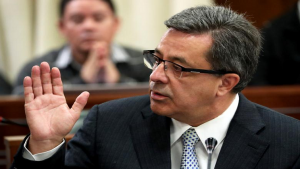The Financial Sector Conduct Authority (FSCA) has officially classified cryptocurrency assets as financial products. In a media briefing earlier on Thursday the financial regulatory body said crypto assets have now been regulated – where foreign exchange controls will be implemented.
Crypto trading companies will also have to be licensed.
The FSCA says it has assessed and justified its position on why crypto assets should be treated as financial products.
Commissioner of the FSCA, Unathi Kamlana, says the industry has been aggressively marketing its products without any oversight on the quality of its products to virtual clients, adding that they cannot allow a situation where crypto is operating in a system outside the regulatory framework. “This is not ideal and not in the public interest.”
He also says the crypto market is growing and they have to be responsive to those changes.
“There has certainly been a wide range of allegations of complaints of fraud and crypto-related scams and other types of operations risks, so the case for regulatory intervention is well made and quite clearly the approach that we advocate for is an all-encompassing one and comprehensive approach to regulation.”
Head of Regulatory Framework at the FSCA, Eugene du Toit, says this declaration is very specific in dealing with the context of financial services rendered in relation to Crypto assets.
“We are not regulating the crypto asset as a product. It does not have the effect that crypto assets are now a form of legal tender, and that’s a very important point; and secondly, there are a lot of questions on crypto asset derivative providers and similarly, this does not affect the derivative space,” explains du Toit.
Eugene Du Toit, Head of Regulatory Frameworks, outlines that this Declaration does not mean the crypto assets are a form of legal tender nor does it effect financial services in relation to crypto asset derivatives#crypto #cryotoassets #FSCATalk pic.twitter.com/oa3epY1RBI
— FSCA South Africa (@fscasouthafrica) October 20, 2022
Risks in virtual assets
South Africa lacks regulatory requirements for service providers of virtual assets. Crypto traders will now have to get licensed under the new regulation, and the financial regulatory body says regulation will enable them to receive data, promote disclosure and understand some of the risks in virtual assets business models.
“Players who are in that space are also licensed and one of the benefits of regulation is the ability for us to ask for information from these entities once they are license, and even in the transitional period what powers do we have to take enforcement action, and so on. Where we are today we have not set up the rules we are unable to say the rules have been broken, and that limits significantly what we are able to do,” says an FSCA representative.
Despite regulating the industry, the FSCA has advised consumers to educate themselves on crypto trading if they would like to participate in that space.
“Customers themselves have to be mindful of the risks that they face, these assets are classified as volatile and risky and it’s quite important for financial customers to get themselves educated on the risks that they face,” states the FSCA.
Jurisdictions and international standard-setting bodies have made a lot of progress in developing a regulatory framework for crypto assets. The FSCA says it will be working with other regulatory bodies such as SARS and the Competition Commission, to level the playing field for the crypto industry.
The regulation declaration takes effect immediately, but the FSCA has made transitional provisions and issued a general exemption to crypto service providers. They will be assessing and issuing licenses in the coming months.
[Media Release]
The FSCA has published the declaration of Crypto Assets as a financial product under the FAIS Act.
The declaration, brings providers of financial services in relation to crypto assets within the FSCA’s regulatory jurisdiction: https://t.co/sUd0Mqu6JE#crypto pic.twitter.com/bsYINvPwUl
— FSCA South Africa (@fscasouthafrica) October 20, 2022






